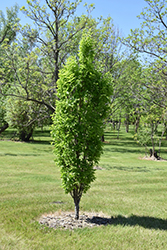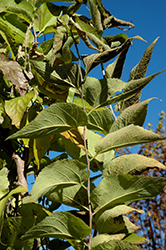Prairie Sentinel® Hackberry Celtis occidentalis 'JFS-KSU1' Height: 45 feet Spread: 12 feet
Sunlight:
Hardiness Zone: 4a Brand: J. Frank Schmidt & Son Co. Description: This very narrow, fastigiate tree is an excellent accent or street tree with almost vertical, upswept branches; exceptional yellow fall color; an incredibly adaptable tree for the most difficult of sites Ornamental Features Prairie Sentinel® Hackberry has rich green foliage with grayish green undersides on a tree with a columnar habit of growth. The pointy leaves turn yellow in fall. The warty gray bark adds an interesting dimension to the landscape. Landscape Attributes Prairie Sentinel® Hackberry is a deciduous tree with a narrowly upright and columnar growth habit. Its relatively coarse texture can be used to stand it apart from other landscape plants with finer foliage. This tree will require occasional maintenance and upkeep, and is best pruned in late winter once the threat of extreme cold has passed. It is a good choice for attracting birds to your yard. Gardeners should be aware of the following characteristic(s) that may warrant special consideration;
Prairie Sentinel® Hackberry is recommended for the following landscape applications;
Planting & Growing Prairie Sentinel® Hackberry will grow to be about 45 feet tall at maturity, with a spread of 12 feet. It has a low canopy with a typical clearance of 4 feet from the ground, and should not be planted underneath power lines. It grows at a slow rate, and under ideal conditions can be expected to live for 80 years or more. This tree should only be grown in full sunlight. It is an amazingly adaptable plant, tolerating both dry conditions and even some standing water. It is considered to be drought-tolerant, and thus makes an ideal choice for xeriscaping or the moisture-conserving landscape. It is not particular as to soil type or pH, and is able to handle environmental salt. It is highly tolerant of urban pollution and will even thrive in inner city environments. This is a selection of a native North American species. Characteristics
Applications
Features & Attributes
|

